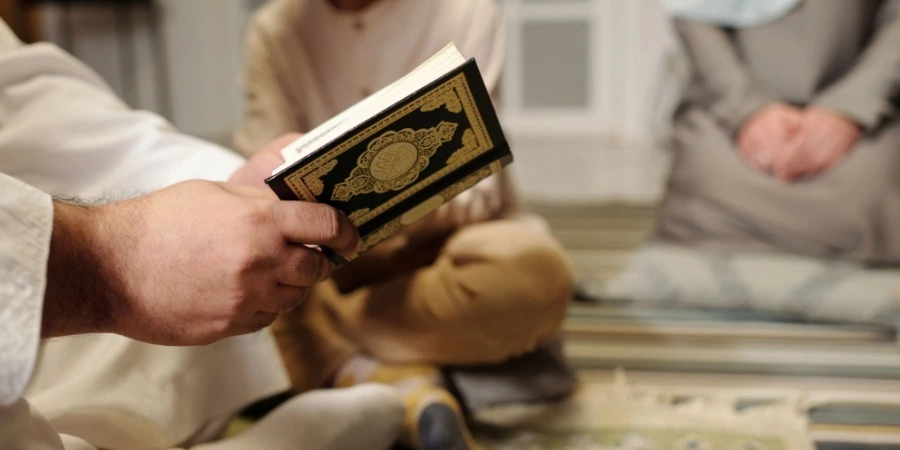Salat al‑Hajah is a special voluntary prayer that is offered by a believer when they face a pressing need or decision and turn to Allah for help. Its purpose is simple yet profound. Seeking Allah’s mercy and power in moments of difficulty. Change. Or any uncertainty. Through this prayer one demonstrates trust. Humility. And hope. Acknowledging that, beyond human effort, there is divine support. Every Muslim, regardless of status, can benefit from this act of worship. Because life brings tests, decisions, and needs. When performed sincerely, this prayer becomes a source of comfort and assistance, reminding the heart that it is never alone. The Theological Foundation of Salat al‑Hajah.
The Theological Foundation of Salat al‑Hajah
Quranic Guidance on Prayer and Patience
Allah says in the Qur’an: “O you who believe, seek help through patience and prayer; surely Allah is with the patient.” (2:153) This verse underpins Salat al‑Hajah by linking prayer with patience (sabr) and trust (tawakkul). When we face hardship, we are invited to turn inward, seek Allah’s help and rely on Him. The practice of this prayer reflects that theological foundation: we act, we wait, we trust. Recognising that reliance isn’t passive but active supports how you approach need with dignity, discipline, and hope.
Prophetic Traditions and Hadith
The Prophet Muhammad ﷺ guided his companions to pray when in need and to make duas from a sincere heart. Some refer to this as Salat al‑Hajah. Though some scholars note the hadith chain is weak, many still permit the approach as a nafl prayer with general du’a. The emphasis is on sincerity, humility, correct intention, and turning to Allah. This prayer strengthens faith by reminding us that even our greatest efforts are supported by divine wisdom, and our need is an invitation to deeper trust rather than despair.
Searching for the Online Quran Courses?
Join our online Quran classes led by certified and experienced tutors from the comfort of your home.
Book Your Free TrialHow to Perform Salat al‑Hajah
When to Pray
You may offer Salat al‑Hajah at any time you feel a genuine need. For a decision, hardship or change. Choose a clean, quiet place, perform wudu, focus your heart and intend to ask Allah. Avoid the times recommended by the Sunnah: from Fajr until sunrise, at the zenith, and after Asr until sunset. Many choose the last third of the night for solitude and depth. The key is heart‑presence, not ceremony. When your intention is clear and your need is sincere, the prayer becomes meaningful.
The Steps of Salat al‑Hajah
Begin with two rak‘ahs (units) of voluntary prayer. After concluding them, praise Allah, send blessings on the Prophet ﷺ, then raise your hands for du’a. Many learners find that joining Quran Memorization Classes helps them understand and recite their duas and Qur’anic chapters more confidently. You may recite the well-known Arabic du’a or speak your own heartfelt words. For example: “O Allah, I ask You by Your mercy and power, grant me my need…” The specific surahs aren’t obligatory; some choose to recite short chapters such as Surah Alam Nashrah as a means of focus. What matters is humility, focus, and trust. Once you complete the du’a, maintain hope and pair the prayer with right action.
Spiritual and Practical Benefits of Salat al‑Hajah
Strengthening Faith and Reliance on Allah
Performing Salat al‑Hajah nurtures trust in Allah, even when answers take time. From many personal stories: “I prayed two rak‘ah then du’a… I felt peace.” It teaches that difficulties are not sign of abandonment but of Allah’s call to connection. The emotional relief, renewed hope, and patient strength come not just from the result but from the act of turning and trusting. In hardship, you become rooted, not shaken.
Seeking Guidance and Success in Life
Beyond emotional support, Salat al‑Hajah is a practical tool for making decisions about job changes, marriage, health, and relocation. When you pray with clarity, you invite divine guidance and align your effort with purpose. The prayer becomes purification: you humble yourself, you submit your plan to Allah, you act with sincerity. Make it regular, not just for crises but for growth. Over time, you build habits of reliance and faith‑driven action that steer your life. Some people find comfort in reflecting on Surah Waqiah during their du’a. The emotional relief, renewed hope, and patient strength come not just from the result but from the act of turning and trusting.
Embracing Salat al‑Hajah in Daily Life
Salat al‑Hajah is a precious spiritual resource that invites you into a deeper connection with Allah. In times of need or uncertainty, this prayer isn’t a last resort. It’s the first step. It offers calm in turmoil, hope in waiting, and clarity in choice. Make this prayer part of your journey. Not just when you’re lost, but when you’re preparing, growing, and trusting. Consider opting for Quran Recitation Classes to refine your recitation and strengthen spiritual development.




